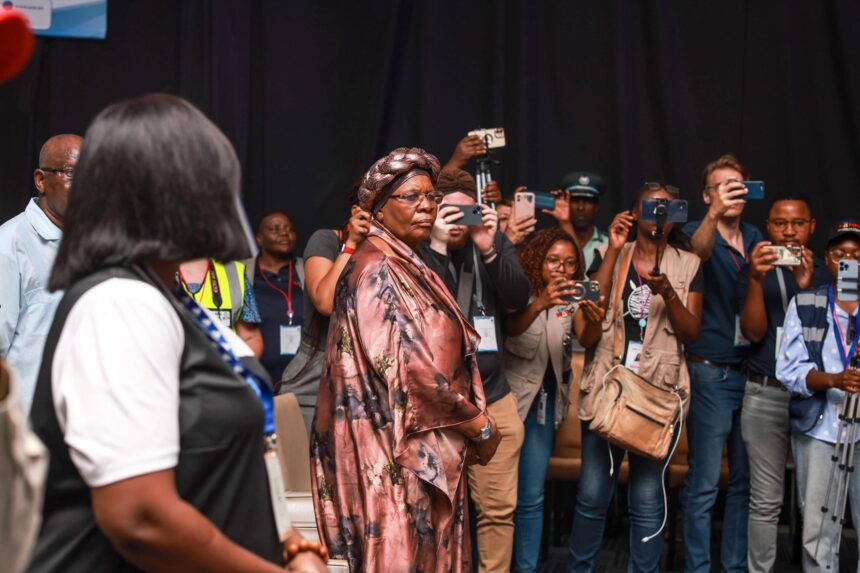After almost half-a-decade of letters flying back and forth, and attempts by some media house bosses to reduce it to a briefcase entity, the Namibia Media Professionals Union (Nampu) was yesterday certified by the Labour Commissioner.
Nampu becomes Namibia’s first-ever union specifically representing and targeting issues which affect journalists and media professionals in general in Namibia.
“Namibia Media Professionals Union has been registered as a trade union in respect of the media industry in the Republic of Namibia with effect from 13 December 2024,” stated Labour Commissioner Kyllikki Sihlahla in a letter seen by this reporter.
Local media professionals launched the union in November 2020 with the sole purpose of organising and uniting journalists and media workers from print, broadcasting and online media to allow for better bargaining and improved working conditions.
Its founding constitution states that members commit themselves to represent journalists and media workers’ voices in defence of press freedom and other civil liberties, defending and promoting members’ social rights, professional and financial interests, and welfare.
Media professionals also plan to defend and promote the principles and practices of journalism, social dialogue, and journalists’ rights in the media industry in Namibia.
Over the years, journalists have tried but failed to register their own trade union, with many fading into obscurity, while others simply ran out of steam due to the tedious registration process and opposition from some established media institutions.
Reaction
Reacting to the news, seasoned sports journalist Michael Uugwanga said it has been long-overdue, and justice is finally coming to media practitioners as they have been operating in a system in which they are not that free to express.
“In particular from media houses who at times dictate to us, the journalists, the type of content that will suit the paper, as we are all aware that media outlets are partially attached or have a soft spot for certain individuals or political parties,” said Uugwanga.
Having been in the craft since 2014, he noted that the move will help journalists to start becoming more independent in their work and address poor salaries, as most journalists earn around N$7,000 per month, which comes with no benefits.
Adding her voice to the discourse, radio journalist and producer Justicia Shipena concurred that Nampu should advocate for better pay, job security and the establishment of clear labour contracts to protect workers from exploitation.
“Job security for media professionals is becoming more precarious, especially in freelance and contract-based positions. Nampu could work towards securing better protection and representation for workers in these vulnerable situations,” said the presenter.
Known for her in-depth reporting on environmental, climate, energy and health issues, Shipena said all eyes are now on the union whether they will elevate the profession to a higher standard, ensuring the protection of both the rights and dignity of media professionals across the country.
“All in all, it is a step in the right direction, and hopefully media houses will welcome negotiations with the union. Another aspect is the independence of the union. Will that affect how the media union would feel safe to bring forth their issues? Those are just some of the questions. But I wait to see how this all shapes out for our industry”, she added.
Senior broadcast reporter Emil Seibeb, on the other hand, was over the moon.
Unified voice
“This is a great step forward in ensuring that media practitioners have a unified voice to advocate for their rights, fair working conditions and professional growth, including better incentives. I look forward to seeing the positive impact the union will have on the media industry in Namibia,” he stated.
Additionally, television producer Josia Shigwedha believes Nampu’s focus should be primarily on addressing salary disparities, and prioritising training programmes which can prepare younger generations studying journalism from different institutions.
“The union should aim to inspire younger generations to uphold the journalism values and issues that are affecting journalists at their workplaces,” he highlighted.
Nampu’s spokesperson Charmaine Ngatjiheue said they aim to also address all labour irregularities members are faced with, ensure that contractual issues are addressed, ensure that other unfair labour practices are addressed, and eventually conduct the necessary training.
“Nampu’s role in Namibia’s media landscape is to safeguard the rights and improve the working conditions of journalists and media professionals. Nampu plans to negotiate for fair wages and benefits, ensure job security, promote ethical journalism, advocate for press freedom and support training and development.”
Ngatjiheue noted that the priority is to get the media industry to get a minimum wage and a grading system.
Additionally, the union aims to take a stance on broader social and political issues affecting their members and the public.


